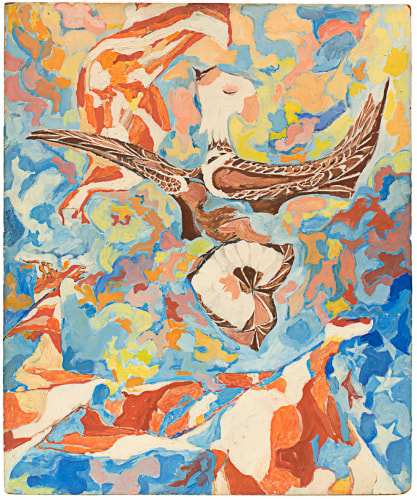
Philip Pearlstein
American Eagle, 1949
Oil on panel
23 7/8 x 19 7/8 inches
THE DAILY PIC (#1477): This image was recently dug out of storage by the great realist Philip Pearlstein, and is now included with other early works – as well as very recent ones – in a show at Betty Cuningham Gallery in New York. Pearlstein painted the piece in the winter of 1949, in his first months in New York, when he was roommates with a young artist then known as Andrew Warhola. The piece speaks to the depth and range of Pearlstein's experimentation in those early years: The influence of the new Abstract Expressionism is obvious, but there's also a purely Pearlsteinian eccentricity. The piece also speaks to Pearlstein's own important influence on his roommate, much less evident at first glance.
It's hard to tell – because of that AbEx scrim we're looking through – but the picture is meant to represent a classic American eagle, icon of the country that had just won World War II (with some help from Pearlstein) and was still battling for dominion over the world's art. Pearlstein's eagle was part of a series of American icons that he made at that same moment, including paintings of a huge dollar sign, a Superman and a Dick Tracy. Pearlstein says that his peers greeted his icons with a stunned silence, and that he gave up on his proto-Pop idea and stored the pictures away. Warhol, however, obviously saw that Pearlstein was onto something. He ran with the same idea a dozen years later, paring it down to its essence at just the moment when it had a good fit with the Zeitgeist.
I'm not for a second accusing Warhol of anything close to plagiarism; his greatest talent, as I've said before, may have been his skill as a sponge, soaking up ideas and imagery that others threw away then turning them into vital parts of our culture. But Pearlstein does deserve some credit as spongee.